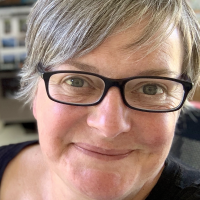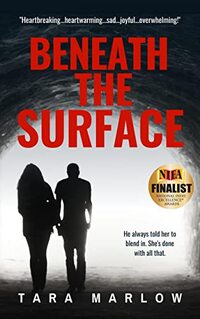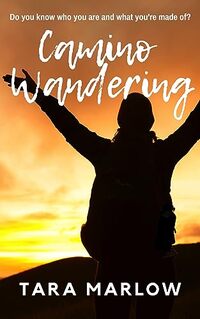Tara Marlow Interview Published on: 02, Jun 2023
 Where have you spent most of your childhood?
Where have you spent most of your childhood?
I grew up in the Hunter Valley in N.S.W., Australia, about four hours northwest of Sydney. My dad was in the Army, so we moved about every eighteen months, between the Hunter and Sydney, but most of my childhood was in the Hunter Valley. I am a country girl at heart.
Were you an avid reader as a child? Do you still read books?Yes - to both questions.
No matter where we lived, one of the first things Mum did was sign us up for a library card. We’d go to the library every week, maxing out the number of books we were allowed. I now live in a small village on the east coast of Tasmania (Australia), and we have a tiny library that’s open three days a week. Getting a library card was the first thing I did when we moved here. Now, I keep track of the books I read in Goodreads and write candid book reviews, which I post on my Patreon site.
What got you into writing? When did you start writing women’s fiction and what is it about this genre that captured your interest?Moving around a lot as a child, stories were my friends. I’d disappear into them. I started writing when I was about twelve or thirteen. My parents quickly regretted the Corona typewriter they gave me as a gift, as I was constantly banging out the short stories. Adulthood came, as did responsibilities, and I put my writing aside.
That was the case until one morning in 2016, when I woke from a vivid dream and thought immediately that it would make a brilliant scene in a novel. So, I grabbed coffee, went to my computer, and stayed for the next eighteen hours. A draft story just poured out of me. That story was the start of my first suspense novel, BENEATH THE SURFACE. Ironically, the dream scene never made it into the published version (2021).
After walking the Camino de Santiago twice in consecutive years, I wrote a memoir. But after ninety thousand words, I was not happy with how it turned out. It didn’t feel right. I had this niggling feeling it should be fiction, and so I started from scratch and CAMINO WANDERING (published in 2020) was the result. As I weaved stories from my own experiences into a fiction, I was also reading a memoir written by Lori Oliver-Tierney, called “Trudge”. It’s Lori’s experience on the PCT. There was a line in her novel that spoke to me:
“Do you know who you are and what you’re made of?”
Suddenly I saw what I needed for my novel, and that line has guided me in ever since. I reached out to Lori to see if I might use that line, (she was happy for me to use it), and discovered it was something her mum used to say to her. Given my novel, CAMINO WANDERING was a dedication to my mum, it seemed like a neon sign to guide me.
Now I love reading and writing novels about women discovering who they are and what they are made of. We, as women, need to lift each other up, and that’s what I hope to do through my novels,
Do you remember the first book you ever wrote? Was it also the first book you got published? If not, why didn’t you publish it?I do. It was BENEATH THE SURFACE, an Australian suspense novel about a seventeen-year-old girl who is on the run with her father and has been since she was five. Except Grace doesn’t know why they are on the run, so it’s a story of her discovering her truth. An early reader classified it as a novel about a teen, but not for teens, as there are quite confronting elements in it. It’s why I have trigger warnings in the book.
While it was the first book I wrote, it started out as a romance novel. After ten rewrites (!), I’m very proud of how it developed and proud of the result. But while working on BENEATH THE SURFACE, I walked my first Camino de Santiago solo in 2018. Suddenly that experience overshadowed all else, and I needed to write about that journey - and the one that followed a year later with my husband. CAMINO WANDERING became the first novel I published. It is women’s fiction, telling the story of three middle-aged women discovering who they are and what they are made of.
Do you have a “reader” in mind while writing?Now I do. It took me a while to define who my ‘reader’ was. I call her Tess. She’s a complicated mess, but I love her. But knowing who is reading my novels gives me clarity when writing - and when marketing my books.
How long did it take you to write “The Decisions We Make”? What do you think makes this book stand out from other mysteries?THE DECISIONS WE MAKE is the second book in my LIFE UPENDED series after CAMINO WANDERING. But the novel doesn’t follow the same characters from CAMINO WANDERING, but you see the continuation of their story. The characters in THE DECISIONS WE MAKE are connected to one character from CAMINO WANDERING, and it could be read as a standalone novel.
It took me about two months to draft THE DECISIONS WE MAKE, which I did during NanoWriMo. After that, it took another six months to edit and rewrite parts of it. I wanted to write a novel set in the village I live in, in Tasmania, which is where one character from CAMINO WANDERING lived. The primary location is a fictional place just outside of the village.
THE DECISIONS WE MAKE has a couple of mysteries woven through it, but its primary genre is women’s fiction. I suppose every book I write could be classified as a mystery. THE DECISIONS WE MAKE touches on the realities of life around grief, motherhood, relationships and moving on.
What was your reaction when you got to know that your novel, Beneath the Surface, was a Suspense Category Finalist in the (U.S.) National Indie Excellence awards?At first, I was over the moon. Then I cried. Mainly because I was so proud, and I loved what eventuated into Grace’s story in BENEATH THE SURFACE. Then I was relieved, knowing that others felt it was a worthy read.
As a first-time author, with no books to your name, how did you market your book?I already had a following from my travel blogging days, so I was lucky to bring some of those followers over to my fiction writing. Before publishing CAMINO WANDING, I created a “street team” from a mix of people I was connected to professionally and personally. I relied on Facebook groups to share news of my Camino based fiction, and I leveraged Amazon Ads to gain a wider audience. (That quickly became a money pit.) I also became a member of my local Indie Author group, and that helped me establish a name in my home state of Tasmania.
Since that time in 2020, my street team has changed and expanded and now I have a solid team I trust and rely heavily on. In late 2021, I discovered Mixtus Media, who publish the podcast ‘Book Marketing Simplified’, where I learned the importance of an ideal reader. But it wasn’t until I joined Mixtus Media’s ‘’The Author Circle and became a member of AllAuthor, did things turn around for me.
How has your writing process evolved since your first book to now?Since BENEATH THE SURFACE began as a dream, I now take now note of the dreams I have. I’ve some roughed out ideas for stories from the dreams I’ve had in recent years. Now, when starting a new novel, I bring out the rough ideas and take two that pique my interest, then create character outlines. I do this even before I write a comprehensive story outline.
It’s not until I start that process that I note which characters seem more interesting, more complex and have a story to tell, that I know which is my next project. I feel you can’t write any novel until you know your characters well.
After that, my writing process is very streamlined. I write the draft, do a first edit, then send it on to my editors. They tell me if the story has legs and where they see major flaws. Then I buckle down for around six months to rewrite and edit. The manuscript then goes out to beta readers with a list of questions, and I edit again with their feedback. At that point, it’s back to the editor, which is mainly a proofread and last-minute suggestions, then it’s finally on to my ‘street team’, whom I call My Lovelies.
How do you usually think up new book plots? Do you have half-baked book ideas that you never got around to finishing? Can we hear some of them?As mentioned, listening to my dreams is pivotal to my writing process. My website is called The Crackpot Writer, because I know it’s an unusual way of writing. Other authors talk about characters talking to them. Mine do through my dreams. (And rarely while I’m in the shower.)
CAMINO WANDERING is a bit of an exception to that rule, but the characters talked to me a lot in those pre-wake moments while I went through rewrites.
I learned the plot twist of BENEATH THE SURFACE from a dream. Grace was very vocal about how her story was to play out.
THE DECISIONS WE MAKE came from a roughed-out storyline about letters, but I wasn’t done writing about The Lovelies in CAMINO WANDERING by then. So I wove those ideas, and my own life experiences of questioning decisions I had made, empty nesting and grief.
THE HOUSESITTER, my current WIP is taken from part dream, part actual life experience as a housesitter. But now I’m in rewrite mode, the characters are now coming out to play.
After I publish THE HOUSESITTER in 2023, 2024 will see the last novel in the LIFE UPENDED series. That novel is called FINDING THE WAY, and it’s set back on the Camino de Santiago. That novel is already half drafted. It, too, will be a mix of life and dreams.
What are some common mistakes that new authors make when they first publish a book?I normally wouldn’t comment on what other authors do, as it’s a steep learning curve, especially for self-published authors. It’s different for everyone.
But I’m very much involved in my local indie author community, and I see budding authors intimidated by the publishing process. Unfortunately, many they put their trust in vanity press publishers, handing over thousands of dollars just to see their books in print. (I was not immune to investigating this path in the beginning.) Sadly, though, all I’ve heard are horror stories where authors get very little in return. I have helped other authors navigate this minefield many times. With patience and openness to learning, self-publishing is a rewarding route. Especially if you plan to publish more than one book.
I have written about my self-publishing journey on my website, hoping it will help other writers navigate the immense amount of information on the web. At least so they can find their footing.
What is the most effective way to practice gratitude every day?Walking, especially in nature. It gives you time to catch your breath from the noise of life, and make you appreciate where you are and what you’ve accomplished. Even writing a story is an accomplishment.
Any advice for budding authors out there? According to you, what makes a really good mystery book?Regarding advice for budding authors, I would say the entire publishing process can be intimidating. But, like childbirth, many have been through it before you. There’s information and advice galore, but listen to your instincts. If something sounds too good to be true, it probably is. Not everyone knows all the answers, but if you find what works for you, that’s your answer. The other thing to remember is that your book will never be perfect. Even Stephen King has said he thinks about how he’d rewrite some of his older works. Instead of trying to make it ‘perfect’, strive to make it a piece of work you are proud of.
For me, a really great mystery is when there’s a shocking twist. Something you didn’t see coming, despite the red herrings the author weaved throughout the story. When I wrote BENEATH THE SURFACE, I had a development editor review it who said she gasped at the climatic twist, and thought “did I just read that correctly?” She said she went back and read the book again and found all the red herrings she missed along the way. I was proud of that.
Which is the next book you are working on? Is it a series or a stand-alone book?My next book is a suspense/thriller set in Tasmania, Australia, titled THE HOUSESITTER. It is due to be published in late 2023. It will be a stand-alone novel.
How did you first learn about the AllAuthor website and how do you think it measures up to other sites that you’ve tried?AllAuthor was recommended to me by a PR manager. I love how you can always find a book that hooks you from the beginning, no matter what your genre. As an author, I love how simple it is to use, and the offerings it provides. My favourite thing about AllAuthor are the mock-ups which are so easy to use in my marketing.
Share Tara Marlow's interview
Tara Marlow grew up in the Hunter Valley in N.S.W., Australia. In 2017, after leaving the corporate world behind, and her nest of familial obligations emptied, she made a daring choice. With an insatiable wanderlust coursing through her veins, Tara took to the road as a nomadic soul, embracing a globe-spanning journey that would span three remarkable years. Camino Wandering, Tara’s debut novel, was released in December 2020. Tara Marlow quickly became synonymous with authenticity, her narratives painted with honesty and vulnerability.




